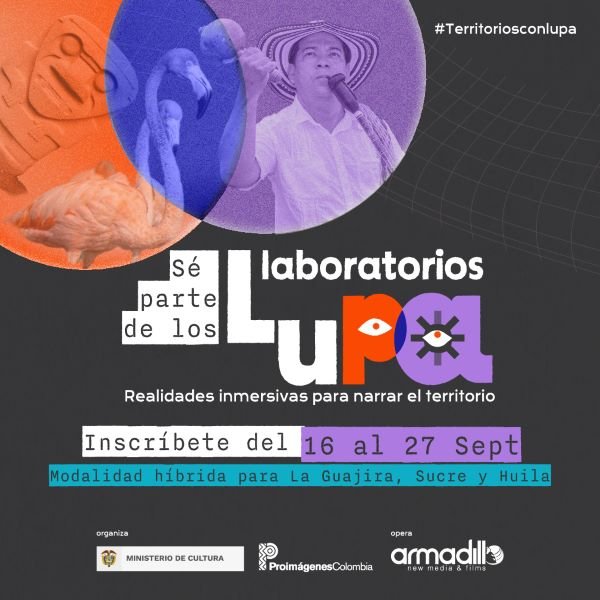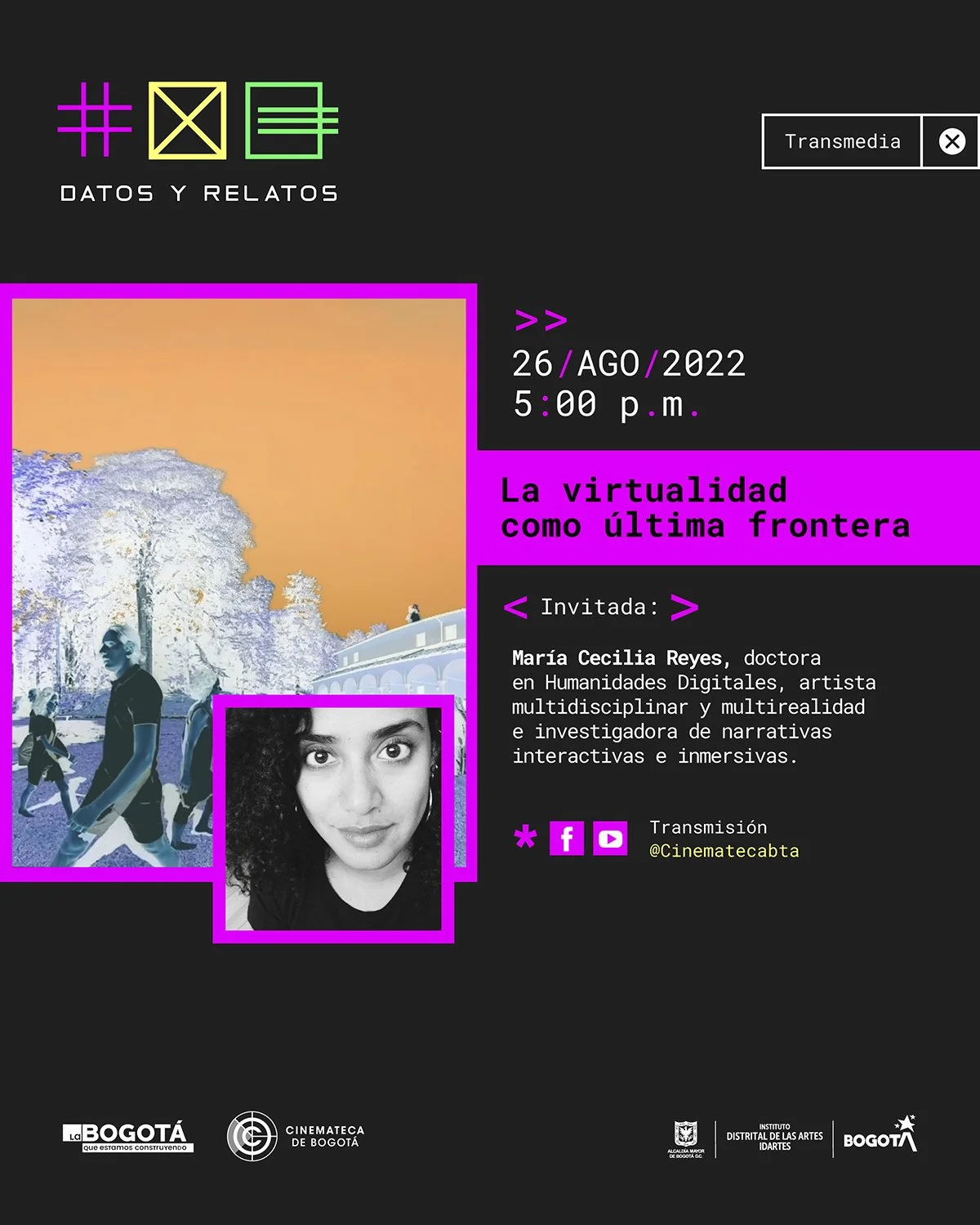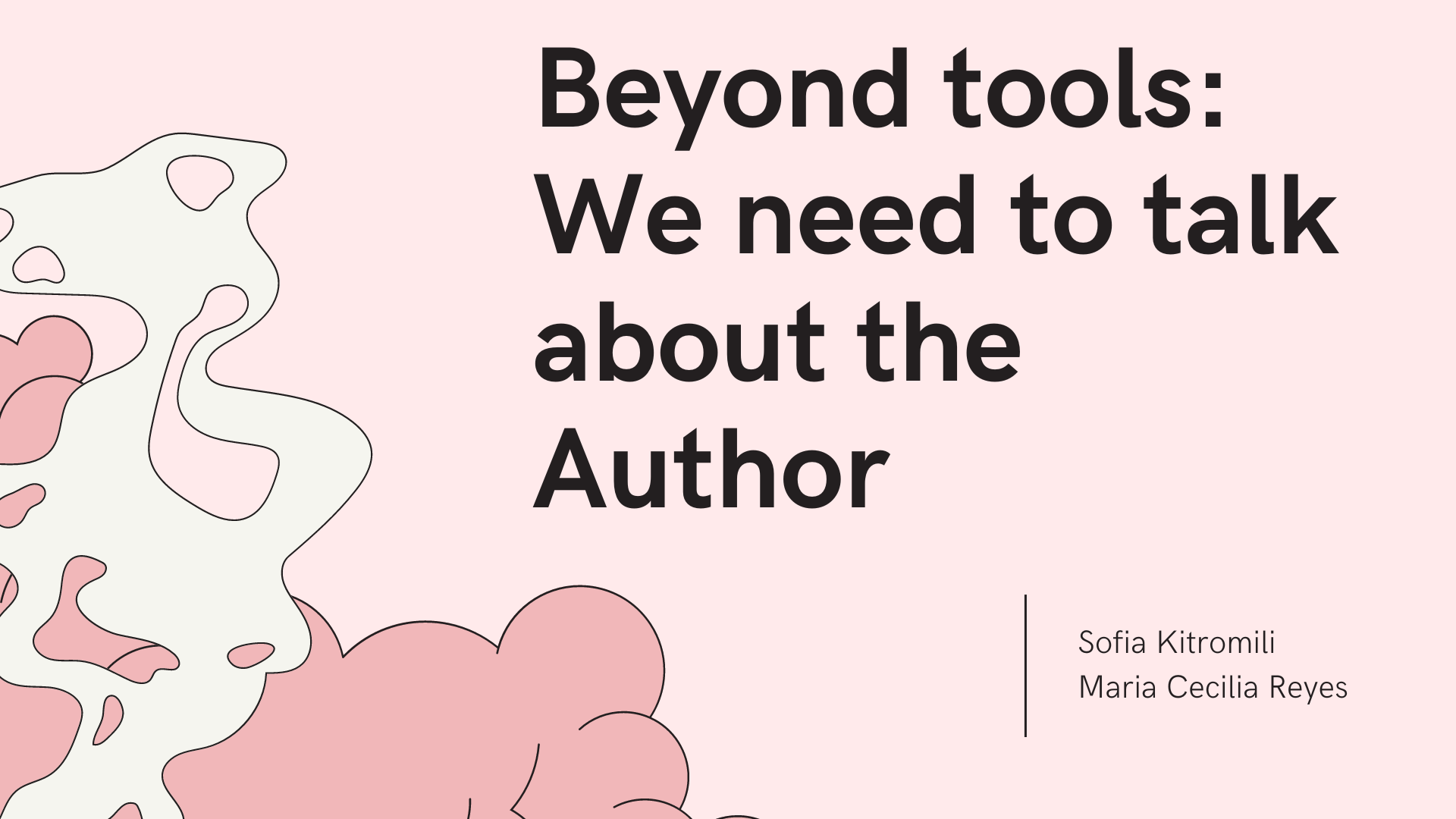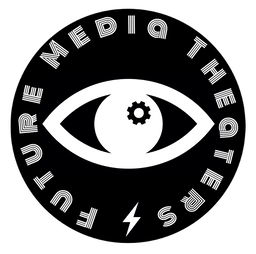Ricerca-creazione: Quando le forme creano valori
Sono stata invitata a partecipare della Giornata di Studi “Ricerca-creazione: quando le forme creano valori” il venerdì 20 e sabato 21 gennaio 2023 a Palazzo Ducale-Fondazione per la Cultura di Genova (Italia), dove presenterò la mia esperienza di ricerca-creazione nello sviluppo della mia tesi di dottorato “Interactive Fiction in Cinematic Virtual Reality: Epistemology, Creation and Evaluation”.
Sono stata invitata a partecipare della Giornata di Studi “Ricerca-creazione: quando le forme creano valori” il venerdì 20 e sabato 21 gennaio 2023 a Palazzo Ducale-Fondazione per la Cultura di Genova (Italia), dove presenterò la mia esperienza di ricerca-creazione nello sviluppo della mia tesi di dottorato “Interactive Fiction in Cinematic Virtual Reality: Epistemology, Creation and Evaluation”.
Da circa vent’anni, con il nome di “ricerca-creazione” è nato un movimento che si è diffuso in circuiti accademici in Canada, negli Stati Uniti e in Francia. Con questo termine si designano pratiche che mirano a decompartimentalizzare le arti e le scienze al fine di rinnovare le forme della conoscenza, di pensare in azione, di produrre nuove maniere di apprendere le realtà sociali, di rendere visibili i problemi pubblici e di costruire altre forme di vita. Queste pratiche privilegiano le attività di indagine, osservazione, ricerca basate su dispositivi artistici che spostano le prospettive e ci inducono a vedere diversamente ciò che a volte abbiamo davanti a noi senza accorgercene, o che ci permettono di sperimentare altri modi di fare e di vivere insieme. Le pratiche della ricerca-creazione si concretizzano sia in attività di ricerca nelle accademie artistiche, sia all’università o in residenze in spazi culturali. Possono essere attività individuali o di gruppo, più o meno radicate nelle istituzioni. Queste pratiche contribuiscono non solo all’osservazione e alla valutazione della realtà, ma anche alla creazione di valori.
La ricerca-creazione si basa sul principio che la ricerca può rinnovare i suoi metodi, gli strumenti e i concetti lavorando a stretto contatto con le pratiche artistiche. Un punto di partenza è l’idea che sono le forme a creare i valori, dato che i valori non possono essere decretati a priori. Le pratiche artistiche diventano così le alleate del ricercatore che, attraverso di esse, cerca di spostare, comprendere, modificare le strutture relazionali sottese alla costruzione dei valori su cui si basano i nostri modi di esistere.
La giornata di studio franco-italiana scommette che queste pratiche che si stanno diffondendo nel mondo e in Italia, generando saperi e forme di vita alternative, non rivendicando necessariamente il nome di ricerca-creazione, ma prendendone la forma.
Introducción a las Narrativas Inmersivas @ Laboratorios LUPA
El 5 de Octubre de 9 a 12 AM (Hora Col) estaré dictando el taller Introducción a las Narrativas Inmersivas en el marco de los Laboratorios Lupa: Realidades inmersivas para narrar el territorio. LUPA es una iniciativa del Ministerio de Cultura de Colombia, Proimágenes, y operado por Armadillo Media.
El 5 de Octubre de 9 a 12 AM (Hora Col) estaré dictando el taller Introducción a las Narrativas Inmersivas en el marco de los Laboratorios Lupa: Realidades inmersivas para narrar el territorio. LUPA es una iniciativa del Ministerio de Cultura de Colombia, Proimágenes, y operado por Armadillo Media.
Los Laboratorios Lupa buscan aportar a la construcción de paz a través del reconocimiento de los territorios haciendo visibles diversos relatos que muestran la riqueza y diversidad del país a través de los formatos que permite el espectro digital y que despiertan un mayor interés entre los ciudadanos por consumir esas historias. Las y los participantes trabajarán en procesos de práctica de creación colectiva en donde generarán ejercicios pilotos y prototipos de contenidos como filtros de realidad aumentada y videos cortos 360 con entrevistas localizadas. En total, se entregarán 25 cupos por cada uno de los departamentos en donde se hará la formación, para un total de 75.
Masterclass "Integrating Interactive Fiction with Cinematic Virtual Reality" @ Kinemalab Gothenburg Studios
I have been invited to give a masterclass at the Kinemalab of the Gothenburg Film Studios in Sweden, on next 15th of October. I will present insights from my experience creating an interactive fiction structure for fiction and documentary cinematic virtual reality experiences.
MASTER CLASS
15 OKTOBER. 13:00-15:00
Anmäl dig: kinemalab@gothenburgstudios.se
Integrating Interactive Fiction with Cinematic Virtual Reality
In this Masterclass, I will present insights from my experience creating an interactive fiction structure for fiction and documentary cinematic virtual reality experiences. I will share thoughts on the audiovisual language of cinematic VR, notions for writing an interactive screenplay, and some questions regarding the creation of immersive narrative experiences.
During the Masterclass, I will be presenting the development and production process of creating an interactive film that uses an interactive fiction structure together with cinematic VR (360º video), while reflecting on the challenges and strategies to overcome the low level of interactivity that cinematic VR offers. I will also share an evaluation framework for this kind of artefact.
#Datos_y_Relatos: La Virtualidad como Última Frontera
El próximo 26 de Agosto estaré compartiendo reflexiones sobre la virtualidad como frontera migratoria en el segmento #Datos y Relatos de la Cinemateca de Bogotá.
El próximo 26 de Agosto estaré compartiendo reflexiones sobre la virtualidad como frontera migratoria en el segmento #Datos y Relatos de la Cinemateca de Bogotá.
Con la aparición de nuevas interfaces para la realidad aumentada, mixta, o virtual, nos hemos convertido en migrantes de la virtualidad. Nos ponemos el visor y partimos hacia nuestra exploración. En el mundo digital atravesamos constantemente innumerables fronteras, a veces sin darnos cuenta. Migramos del espacio al ciberespacio, del universo al metaverso, de lo físico a lo digital, de lo documental a lo ficcional, de lo natural a lo artificial, sin siquiera preguntarnos ¿Qué es lo real?. Hoy en día, la visión distópica de una catástrofe natural que podría generar un éxodo hacia la virtualidad, no resulta ya una idea absurda. Frente a la vastedad del espacio virtual, dejamos de ser solo migrantes para convertirnos en colonizadores de una realidad que aún debe ser construida y habitada. En esta charla, propongo un viaje hacia la virtualidad como última frontera de la experiencia humana.
Beyond tools: We need to talk about the Author
Sofia Kitromili and I will be presenting our position paper “Beyond tools: We need to talk about the Author” at the Narrative and Hypertext Workshop during the conference HT ’22: 33rd ACM Conference on Hypertext and Social Media, held in Barcelona.
Some results of our activity.
Sofia Kitromili and I presented our position paper “Beyond tools: We need to talk about the Author” at the Narrative and Hypertext Workshop during the conference HT ’22: 33rd ACM Conference on Hypertext and Social Media, held in Barcelona.
Beyond Tools: We need to talk about the Author (Position Paper. PDF)
Sofia Kitromili (Bournemouth University, UK) and Maria Cecilia Reyes (Vilnius University, Lithuania)
Abstract: Ever since digital interactive authoring tools made creating IDNs (Interactive Digital Narratives) approachable to a wide audience of people beyond programmers and curious academics, we have not stopped talking about them. We have been inventing them, testing them, improving them, and re-inventing them tirelessly. As we should. However, if we take a step back and think about what we have really been talking about, whenever we meet to discuss interactive digital narratives, is tools, narrative forms, ‘the authoring problem’, and while all those are topics we should be discussing, and building knowledge on, we have forgotten to discuss about humans. Who are we building these tools for? Who is using them to make the stories? How are they using them? It is about time we take a break from talking about the myriads of our tools. In this article we are going to talk about the interactive author, or as we shall refer to them at the end of this article, the interactive creator.
Next stop: Scholar-artist in residence @ Future Media Theaters
I’m honored of being selected as scholar-artist in residency at the Future Media Theaters at the University of Skövde. I will be in Skövde during the month of May sharing knowledge and expertise with one of my favorite persons in the world, Prof. Rebecca Rouse.
I’m honored to have been selected as scholar-artist in residency at the Future Media Theaters at the University of Skövde. I will be in Skövde during the month of May sharing knowledge and expertise with one of the researchers that have heavily influenced my work, and one of my favourite persons in the world, Prof. Rebecca Rouse.
During the residency, I will collaborate on the development of the Future Media Theaters immersive 360-degree VR cave platform, helping to create a workflow for porting VR artworks designed for HMD interfaces to this room-scale system.
I will also share methods of VR filmmaking and interactive narrative design with both the GAME Lab Research Group, and with the University of Skövde Game Development students in the Interactive Performance and Games course, and visit Future Media Theaters partner organisation Folkteatern Gothenburg to consult on the development of their VR theater initiative.
Stay tuned for the outcomes!
[Cuaderno de Cine Colombiano Nº31] De la Cinematografía a la Inmersografía
El 6 de abril de 2022, la Cinemateca Distrital de Bogotá, lanzó el Cuaderno Nº31 de Cine Colombiano, dedicado a las "Experiencias Cinemáticas" en nuevos medios, editado por Felipe Cesar Londoño. No solo tuve el honor de escribir para el cuaderno en el capítulo “De la Cinematografía a la Inmersografía: Creación de Realidades Virtuales Narrativas”, sino de presentar mis ideas durante el lanzamiento del cuaderno.
El 6 de abril de 2022, la Cinemateca Distrital de Bogotá, lanzó el Cuaderno Nº31 de Cine Colombiano, dedicado a las "Experiencias Cinemáticas" en nuevos medios, editado por Felipe Cesar Londoño. No solo tuve el honor de escribir para el cuaderno junto a grandes como Alejandro Angel T., Arnau Gifreu Castells, Sandra Tabares-Duque, Elder Manuel Tobar Panchoaga, sino también presentar mis ideas durante el lanzamiento.
Me vienen a la mente varias reflexiones que marcan el rumbo a seguir para América Latina y Colombia:
1. Nuestras raíces ancestrales se extienden en la esfera digital: sentimos una fuerte necesidad de conservar y comunicar nuestros saberes indígenas a través de los medios digitales. El saber indígena se nos presenta como un nuevo paradigma sociocultural y tecnológico, como un modo (quizás el único) de mantener el espíritu humano conectado a la naturaleza, mientras la tecnología ocupa cada vez más espacio en nuestra sociedad.
2. Narrativas inmersivas como terapia colectiva: vemos el poder terapéutico de las narrativas interactivas e inmersivas para ayudarnos a sanar nuestra historia de violencia, los traumas de la colonización y de la desigualidad. Al mismo tiempo, reconocemos la necesidad de poner nuestras creaciones al servicio de nuestras comunidades, obligándonos a buscar maneras creativas de conectar lo digital con lo real, de llegar a todos los públicos, de contar para todos.
Y así... seguimos narrando, transformando el dolor en arte, invitando al mundo a verse a sí mismo a través de nuestros ojos.
Descarga el Cuaderno de Cine Colombiano Nº31 en el siguiente enlace:
INDCOR Interview: “My career has always been a negotiation between the artistic path and academia”
She is filmmaker, storyteller, screenwriter and also, the INDCOR Social Chair and the Virtual Networking Manager. From Barranquilla (Colombia), with a double PhD from the University of Genoa (Italy) and Universidad del Norte (Colombia), she moved to Germany to be Artist-in-Residence at Schloss Solitude Akademie. Together with six Virtual Mobility grantees, she will be working on a virtual strategy to improve the networking of the INDCOR members.
INDCOR Communications Chair interviewed me for the blog of our COST Action CA18230 - Interactive Narratives Design for Complexity Representations, during our fall meeting in Budapest.
Here is the full post.
She is filmmaker, storyteller, screenwriter and also, the INDCOR Social Chair and the Virtual Networking Manager. From Barranquilla (Colombia), with a double PhD from the University of Genoa (Italy) and Universidad del Norte (Colombia), she moved to Germany to be Artist-in-Residence at Schloss Solitude Akademie. Together with six Virtual Mobility grantees, she will be working on a virtual strategy to improve the networking of the INDCOR members.
How did you know about INDCOR?
I joined the Interactive Digital Storytelling community through our conference ICIDS of 2015 in Copenhagen. At the time, I was in the first year of my PhD in Digital Humanities at the University of Genoa (Italy), and as a filmmaker and storyteller, I was interested in interactive ways to tell stories. The academic conference and the art exhibition of that year literally opened a new world for me. A great number of colleagues from this community are now working on a new frontier of the field of interactive digital narratives, that is the representation of complexity, INDCOR. When I heard about using IDNs to analyze complexity, at the first edition of the ZIP-SCENE conference in Budapest, my mind was overwhelmed about all the possibilities that IDNs offer us to understand our world.
What does it mean to be the Social Chair?
This position came up with the pandemic situation, and the need to gather the members of our action to meet each other and discuss relevant topics for our work. Collaborations, papers, projects, new ideas often are generated in relaxed environments, the breaks in the conference, a networking dinner, a walk, so the social chair position was intended to generate these spaces online. We started to use gather.town to make the meetings, and probably some of you can remember the first INDCOR social when we were banned by Facebook for promoting our keynote speakers on conspiracy theories narratives. With this position that now has become Virtual Networking Support Manager, my main goal is to facilitate the networking between the members of the action, for the production of knowledge, but also to create new unexpected synapses in our network.
How is your research related to Interactive Digital Narratives?
I come from a communication sciences background, I have worked in radio for many years, and simultaneously I have worked as a documentary filmmaker. My career has always been a negotiation between the artistic path and academia. In my city, Barranquilla in Colombia, I started teaching the first course on audiovisual narratives and new media, back in 2013. This is how I started doing research but also producing interactive video stories, some with my students, and some on my own. In 2014, with the hype of 360º video, and interactive 360º video, I started to get close to virtual reality research. And my PhD thesis is precisely about “Interactive Fiction in Cinematic Virtual Reality“, I would say in the heart of IDNs.
As an artist, where can we see you work?
Some of my artistic work can be found on my online portfolio Xeh Reyes. However, recently with my VR projects I’ve been facing an issue very well-known for new media artists, and that is the obsolescence of the platforms, hardware and software that we used to create our work. I’m working together with the team of the authoring software that I used to create my projects to find a way to reproduce my work on newer VR headsets.
You are involved in the Virtual Networking Support Team for INDCOR. What is the main goal of this group?
This opportunity was born thanks to the Virtual Networking Tools that COST habilitated last year due to the pandemic. Together with the Virtual Networking manager and six Virtual Mobility grantees, we are about to implement a very complete strategy to improve the networking between the action members. The strategy includes the organization of our asynchronous and synchronous networking tools as Google Drive and Discord, but also new online activities as workshops and training sessions with external stakeholders, and in general improved procedures to work on our field and publish our results. This is a dream team formed by early-career researchers with great ideas and energy to boost the action.
Invited Speaker - Monthly ARDIN Online Social
I have the honor to be an invited speaker together with Josh Fisher on the first ARDIN online social, next 30th of September on gather.town.
On September 30th we will be hosting our first ever ARDIN social and grad student meet-up!
Time: 1 pm to 3 pm EST | 7 pm to 9 pm CET
Agenda:
ARDIN Social: Discussion of news relevant to the community, 1 invited speaker (Josh Fisher), member's announcements, academic speed-dating session.
Grad Student Meet-Up: A roundtable discussion of what our community's graduate students are working on, 1 invited speaker (Maria Reyes). Graduate students, come ready to briefly pitch the projects you're working on!
About the Speakers:
Josh Fisher: I work with emerging media forms to facilitate social change. My specific focus is on community storytelling and I collaborate with community leaders, artists, educators, writers, and students on stories of communal significance. For example, I developed an augmented reality storytelling platform for Georgia Tech. Then, as part of my research, assessed the impact of the platform through both qualitative and quantitative methods. Over the years, I have become an established public speaker and storyteller with performances, lectures, and talks on digital publishing, interactive narratives, and augmented reality design. I have had the pleasure of teaching courses on visual design, interactive storytelling, communication and culture, mobile and web design.
Maria Reyes is a Colombian researcher and screenwriter based in Italy and working as a researcher at the Institute of Educational Technologies at the National Research Council of Italy (CNR-ITD). She holds a double PhD degree in Digital Humanities from the University of Genoa (Italy) and in Communication Sciences from Universidad del Norte (Colombia). Her research focuses on interactive digital narratives, immersive technologies and distance learning processes.
During her career, Dr. Reyes - known to her friends as Xeh - has worked as lecturer in digital storytelling and cinema; as a screenwriter and editor for cinema; as a creator of interactive VR projects; and as a radio producer at the Latin American Association of Educational Radio (ALER). She is researcher-in-residence 2020-2021 at Schloss Solitude Akademie. Co-curator of ICIDS 2020 Art Exhibition.







![[Cuaderno de Cine Colombiano Nº31] De la Cinematografía a la Inmersografía](https://images.squarespace-cdn.com/content/v1/57c88e7615d5db26d8ab6bf3/1649338989145-3YT5ZWEJ90C1ERBB05L9/CineColombiano_No.31_FC.jpg)




